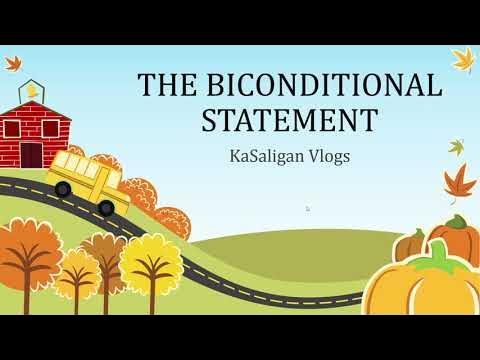EQUIVALENT STATEMENTS | De Morgan's Law for Statements
Summary
TLDRThis tutorial explores the concept of equivalent statements in logic, focusing on De Morgan's Laws. Equivalent statements are those that have the same truth value in all possible scenarios. The video demonstrates how to apply De Morgan's Laws to simplify logical statements, such as transforming 'not P or Q' into 'not P and not Q'. Through practical examples, viewers learn how to rewrite compound statements into their equivalent forms, offering valuable insights for those studying logical reasoning and formal logic.
Takeaways
- 😀 Equivalent statements are two statements that have the same truth value for all possible truth values of their components.
- 😀 De Morgan's Laws are used to find equivalent forms of logical statements by transforming conjunctions and disjunctions.
- 😀 The first De Morgan's Law states that the negation of a disjunction is equivalent to the conjunction of the negations: `¬(p ∨ q) ≡ ¬p ∧ ¬q`.
- 😀 The second De Morgan's Law states that the negation of a conjunction is equivalent to the disjunction of the negations: `¬(p ∧ q) ≡ ¬p ∨ ¬q`.
- 😀 Truth tables are a useful tool for evaluating logical expressions and showing how De Morgan's Laws apply to compound statements.
- 😀 The number of rows in a truth table is determined by the number of simple statements involved, following the formula `2^n` where `n` is the number of variables.
- 😀 In De Morgan’s Law applications, negating conjunctions or disjunctions allows us to rewrite statements in different logical forms that are equivalent in truth value.
- 😀 A practical example: 'I did not pass the test and I did not complete the course' can be rewritten as 'It is not true that I passed the test or I completed the course.'
- 😀 Another example: 'I bought a new car and I moved to Florida' can be rewritten as 'It is not true that I bought a new car or I moved to Florida.'
- 😀 The ability to rewrite statements using De Morgan’s Laws helps in simplifying and analyzing logical expressions, particularly in fields like mathematics and computer science.
Q & A
What are equivalent statements in logic?
-Equivalent statements are two logical statements that always have the same truth value, regardless of the truth values of their components.
What is De Morgan's Law in logic?
-De Morgan's Law provides rules for negating compound logical statements involving 'and' (∧) and 'or' (∨). It shows how to rewrite negated statements in simpler forms.
What does the first part of De Morgan's Law state?
-The first part of De Morgan's Law states that the negation of a disjunction (P ∨ Q) is equivalent to the conjunction of the negations (¬P ∧ ¬Q). In words, 'not (P or Q)' is the same as 'not P and not Q'.
What is the second part of De Morgan's Law?
-The second part of De Morgan's Law states that the negation of a conjunction (P ∧ Q) is equivalent to the disjunction of the negations (¬P ∨ ¬Q). In words, 'not (P and Q)' is the same as 'not P or not Q'.
How do truth tables help in understanding De Morgan's Laws?
-Truth tables show how the truth values of individual components (P and Q) affect the overall truth value of the compound statement. They help verify that both sides of the equivalence in De Morgan's Laws yield the same results.
Can you give an example of De Morgan's Law applied to a real-life statement?
-Yes! Consider the statement 'I did not pass the test and I did not complete the course.' Using De Morgan’s Law, the equivalent statement would be: 'It is not true that I passed the test or I completed the course.'
How does De Morgan’s Law apply to statements involving 'and'?
-When applying De Morgan's Law to statements involving 'and' (∧), the negation of a conjunction (P ∧ Q) is rewritten as the disjunction of the negations (¬P ∨ ¬Q). For example, 'not (P and Q)' becomes 'not P or not Q'.
What is the importance of equivalence in logical statements?
-Equivalence in logical statements ensures that two different ways of expressing a compound statement yield the same truth value, which is useful for simplifying logic and reasoning processes, especially in fields like mathematics and computer science.
In the example 'I bought a new car and I moved to Florida,' how would De Morgan's Law transform it?
-Using De Morgan's Law, the negation of 'I bought a new car and I moved to Florida' would become 'It is not true that I bought a new car or I moved to Florida.'
How does De Morgan’s Law help in simplifying logical expressions?
-De Morgan's Law helps simplify logical expressions by allowing negations to be distributed across 'and' and 'or' connectives, transforming complex statements into easier-to-understand forms, which is helpful in logic, computer programming, and mathematical proofs.
Outlines

This section is available to paid users only. Please upgrade to access this part.
Upgrade NowMindmap

This section is available to paid users only. Please upgrade to access this part.
Upgrade NowKeywords

This section is available to paid users only. Please upgrade to access this part.
Upgrade NowHighlights

This section is available to paid users only. Please upgrade to access this part.
Upgrade NowTranscripts

This section is available to paid users only. Please upgrade to access this part.
Upgrade NowBrowse More Related Video
5.0 / 5 (0 votes)





